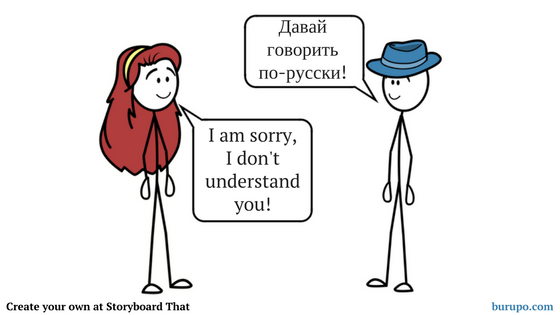Those students who have to talk with Russians daily usually acquire the new language quite quickly. And only grammar mistakes let you know, that they have been learning Russian for not such a long time. But what can their “less lucky” peers do, if they have nobody to practice Russian with outside of the classroom? It affects the speed of learning, after all.

Of course, real communication with native-speakers is the best way to practice a foreign language, but there are other quite effective approaches. Although, these techniques require more motivation than “lucky” students need (if you need to speak Russian at work, you will do it, no matter how excited you are about it).
Alternative language partners
Students complain that in their daily life they have nobody to talk Russian with quite often. Some of them have no Russian acquaintances, Russian friends of others speak English well enough, and some have just a few contacts with Russians during the day. But is it so necessary to find a native-speaker language partner? Most probably some of your friends or colleagues do also learn Russian and have nobody to practice with as well. Practice Russian together could be a good solution. They maybe won’t notice some of your mistakes and will speak with an accent. But you will have to build phrases in Russian and to pronounce them well enough (so that your partner could understand you) right in the same way as talking with a native. And some students (especially beginners) may even feel more confident talking to another learner.
And what if your friends don’t want to talk Russian and keeps speaking your mother tongue? That’s sad, but it is their choice. You still can speak Russian as far as your partner understands you. It is quite likely you will both speak Russian in a few minutes. I had such an experience. Once, I have agreed with my colleague to talk English with each other. And when another our colleague joined us at the lunch-time we kept speaking English. She managed to reply us in Russian for only about a minute then joined our ‘game’ too. You can even make a kind of competition: the one who first says ten words not in Russian buys ice-cream to all the participants.
Be your language partner yourself
If you have no acquaintances learning Russian (or you meet them only at the lessons), try to talk Russian to yourself (to translate your thoughts into Russian). I read about this method in a book of a famous Hungarian translator (and the polyglot) Kato Lomb, Polyglot: How I learn Languages. I like it a lot, as it helps to acquire new words and grammar structures much faster. Moreover, this way you immediately realize which words you are lack of at the moment. So you can check them in a dictionary and learn straight away instead of waiting for they appear in a textbook. This technique seems not that easy in the very beginning, as you all the time need to remember to translate instead of just thinking. But you get used to it soon and at some point start thinking in a new language.
Listen and repeat
You need not only to transform your idea into a phrase to be understood, but also to pronounce it right. That is why you may need to work on phonetics, especially if your mother tongue’s sounds are significantly different from Russian sounds. And I highly recommend the listen-and-repeat exercise here.
First, find a good text with audio. Then listen to one phrase and try to repeat it with the same speed, sounds, and intonations. Listen and repeat one phrase several times until you more or less like the way you sound.
Learning Chinese, I did it a lot. The most difficult in Chinese pronunciation are tones. The meaning of a word depends on them. If you make mistakes in tones, nobody understands you. When I was in China for the first time, I asked for aubergines in all the restaurants we visited. The Chinese word for aubergines is qiezi, but the tone is the one I struggled the most. Nobody understood what I wanted for my first week there. People usually thought that I was speaking English, and tried to help me by offering familiar English words (chicken, cheese, etc.). I did need to improve my pronunciation! So I listened-and-repeated for 5-10 times with each phrase. And it worked! Afterwards one of my peers even told me, that she liked my pronunciation as she understood everything I said at lessons.
Read, write and socialize
Are you interested in the spoken Russian? Social networks are helpful here. And there is no any need to search for a Russian pen friend. Choose any Russian-speaking group, forum or page based on your interests and join the discussion. You will find lots of Russians there (instead of the only one pen friend), and those people will have the same interests as you do! So this way it will be not just communication for the sake of learning, but a meaningful conversation.
And if you want to get your writing checked, to ask a linguistic or cultural question, there are social networks for language learners. I prefer Lang-8, but there are many others. You can post any text (or question) there; native speakers will check it and leave their comments for you. The same thing is possible on Italki. And Russian Language Stack Exchange is the best place for questions.
Watch and study
You need not only to speak yourself when communicating but to understand your partner as well. I suppose you already know lots of ways to practice listening: watching films, soap operas, cartoons, news, advertisements, listening to music, radio, podcasts, audiobooks. There is plenty of options for any taste.
As to me, I prefer to listen to podcasts (especially in the metro) and to take online courses on Coursera or Future Learn.
You practice almost everything by taking a course. You watch videos, read articles, write tests or reflections, take part in discussions. And this way you not only learn a language but also learn something new within the field of your interests. When one of my friends took the course on Coursera for the first time, she learned many new words in the first day. Her conclusion was: it is much better to learn English by applying it to something meaningful, and not just for the sake of English itself.
There are already some MOOCs by Russian universities in Russian on Coursera. And much more of them you can find on Universarium and the National platform for open education.
And what are your favorite ways to practice Russian (or another foreign language)?


Leave a Reply